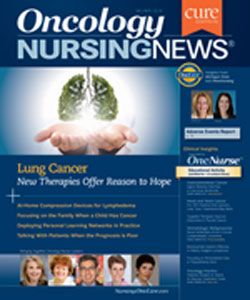Improving Outcomes in Lung Cancer With Multidisciplinary Care
Navigation is an essential component of quality care for patients with lung cancer and their family caregivers, and the Bonnie J. Addario Lung Cancer Foundation (ALCF) is working to improve lung cancer outcomes through its Community Hospital Center of Excellence (COE) program.
Danielle Hicks

Danielle Hicks
Navigation is an essential component of quality care for patients with lung cancer and their family caregivers, and the Bonnie J. Addario Lung Cancer Foundation (ALCF) is working to improve lung cancer outcomes through its Community Hospital Center of Excellence (COE) program.
The program, which launched a 12-month pilot program in 2013, defines a standard of care for treating patients with lung cancer with the objective of accelerating detection and improving treatment. Centers that adopt and practice the standard of care are awarded a formal seal of excellence by ALCF.
“We started this program asking, ‘How can we reach people that don’t have the benefit of reaching us first? How can we ensure that they’re directed to the best standards of care?’” explained Danielle Hicks, ALCF’s senior director of Patient Services and Programs.
Following an improvement in overall progression-free survival during the pilot period, the official COE Program kicked off in 2014.
According to ALCF, 80% of patients with lung cancer receive treatments at their local community hospitals, and the organization advocates for multidisciplinary care with pathways including early detection, diagnosis, treatment, and survivorship follow-ups.
Currently, there are 13 official COE sites in Alabama, Florida, Tennessee, Texas, California, Illinois, Wisconsin, and North and South Carolina.
“It’s not good enough for hospitals to say that they treat patients. We want to know what happens to those patients, and we want to make sure that they go through the entire process,” Hicks said.
“Nurse navigation is key to making this work. Without a dedicated nurse navigator walking these patients through the process, we found that they absolutely don’t work. Nurses are one of the most integral parts of the multidisciplinary team.”
Participating hospitals must work within the guidelines of the National Comprehensive Cancer Network (NCCN) and the COE program.
The ALCF collects data monthly from the centers’ nurse navigators to analyze areas of performance including patient volume, survival rates, readmission rates, number of referrals, and stage of diagnosis.
Some of the outcome objectives include an increase in patient volume, early detection, progression-free survival, percentage of patients receiving molecular testing, and the number of patients referred for clinical trials. The program also aims to reduce the number of patients dying within 30 days of diagnosis, reduce 30-day readmission rates, lower emergency room visits, and save lung cancer—related costs.
Of the more than 3000 patients throughout the 13 COEs, 100% are molecularly tested compared with 70% prior to the COE program, and the average time from diagnosis to treatment is 14.5 days. The national average is 40-45 days.
Additionally, 21% of patients are living with cancer for at least 3 years, 26% were diagnosed at stage IIb or lower, and nearly 100% survived beyond 30 days.
“True multidisciplinary teams start with early detection and follow the patient through survivorship,” Hicks said. “We knew that this approach would help the patient, but once we had the data, we hit the ground running.”
Along with recognizing hospitals that use a multidisciplinary approach in caring for lung cancer, ALCF also works with hospitals that are not multidisciplinary to help them implement such services and programs.
Hicks said that with the recent advancements in therapies for lung cancer, some centers are not up to date on their equipment, particularly for targeted radiation.
“When it comes to discovery and how fast things are happening right now, it’s unreasonable to expect that a general oncologist can keep up with these things in real time,” she said. “We help educate centers on what’s happening with lung cancer right now, and we work with centers where oncology hasn’t always been their focus.”
Additional sites are expected to be recognized as COEs pending a full evaluation. Hicks also said that ALCF plans to host a summit toward the end of 2016 where a representative from each center can benchmark the correlated data from their center against others.
To learn more about the ALCF and COE Program, visit:
https://www.lungcancerfoundation.org/patients/centers-of-excellence/



